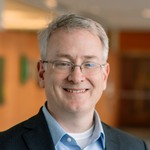Keynote Address: Targeting mechanobiological feedback in fibrosis
Abstract
Fibrotic tissue remodeling is a pathological process that contributes to ~40% of deaths in the US. Understanding the mechanisms that drive this process, and how it might be blocked or reversed, remains a major unmet medical need. Over the past 15 years we and several other groups have demonstrated that feedback from the mechanical environment plays an important and active role in propagating fibrosis, in part through mechanical activation of fibroblasts via a number of mechanisms that together enhances their proliferative, matrix synthetic and contractile capacities. Recognizing that such feedback is inherently unstable, we have also focused on the homeostatic cell-cell and tissue level interactions that normally restrain, and might potentially reverse, such fibrotic processes. As a relevant example, this presentation will focus on recent work linking dopamine D1 receptor signaling to inhibition of the mechanically-regulated transcriptional cofactors YAP and TAZ in lung fibroblasts in vitro and in vivo. Our ongoing work demonstrates an important role for endogenous dopamine signaling in the natural resolution of experimental lung fibrosis and highlights the potential for therapeutic activation of dopamine D1 receptors to reverse mechanobiological feedback to resolve fibrosis in human disease.
 Daniel Tschumperlin, Ph.D., is a Professor and vice chair in the Department of Physiology and Biomedical Engineering at Mayo Clinic in Rochester, Minnesota, with a joint appointment in the Division of Pulmonary and Critical Care Medicine. Dr. Tschumperlin earned his B.S. in Mechanical Engineering at Rice University and his M.S. and Ph.D. in Bioengineering at University of Pennsylvania. Prior to joining the Mayo Clinic Dr. Tschumperlin was a postdoctoral fellow and then faculty member at the Harvard School of Public Health. Dr. Tschumperlin’s research focuses on the respiratory system and how the structure, function and mechanics of the lung are regulated in health and disease. His research is funded by the National Institutes of Health, the US Department of Defense, as well as industry and institutional grants. He serves on the scientific advisory board for Science Translational Medicine and on the editorial board of American Journal of Physiology: Lung Cellular and Molecular Physiology. He recently served as chair of the NIH Lung Injury, Repair and Remodeling Study Section, and is co-chair of the upcoming Gordon Research Conference on Lung Development, Injury and Repair.
Daniel Tschumperlin, Ph.D., is a Professor and vice chair in the Department of Physiology and Biomedical Engineering at Mayo Clinic in Rochester, Minnesota, with a joint appointment in the Division of Pulmonary and Critical Care Medicine. Dr. Tschumperlin earned his B.S. in Mechanical Engineering at Rice University and his M.S. and Ph.D. in Bioengineering at University of Pennsylvania. Prior to joining the Mayo Clinic Dr. Tschumperlin was a postdoctoral fellow and then faculty member at the Harvard School of Public Health. Dr. Tschumperlin’s research focuses on the respiratory system and how the structure, function and mechanics of the lung are regulated in health and disease. His research is funded by the National Institutes of Health, the US Department of Defense, as well as industry and institutional grants. He serves on the scientific advisory board for Science Translational Medicine and on the editorial board of American Journal of Physiology: Lung Cellular and Molecular Physiology. He recently served as chair of the NIH Lung Injury, Repair and Remodeling Study Section, and is co-chair of the upcoming Gordon Research Conference on Lung Development, Injury and Repair.
